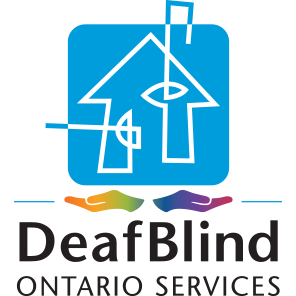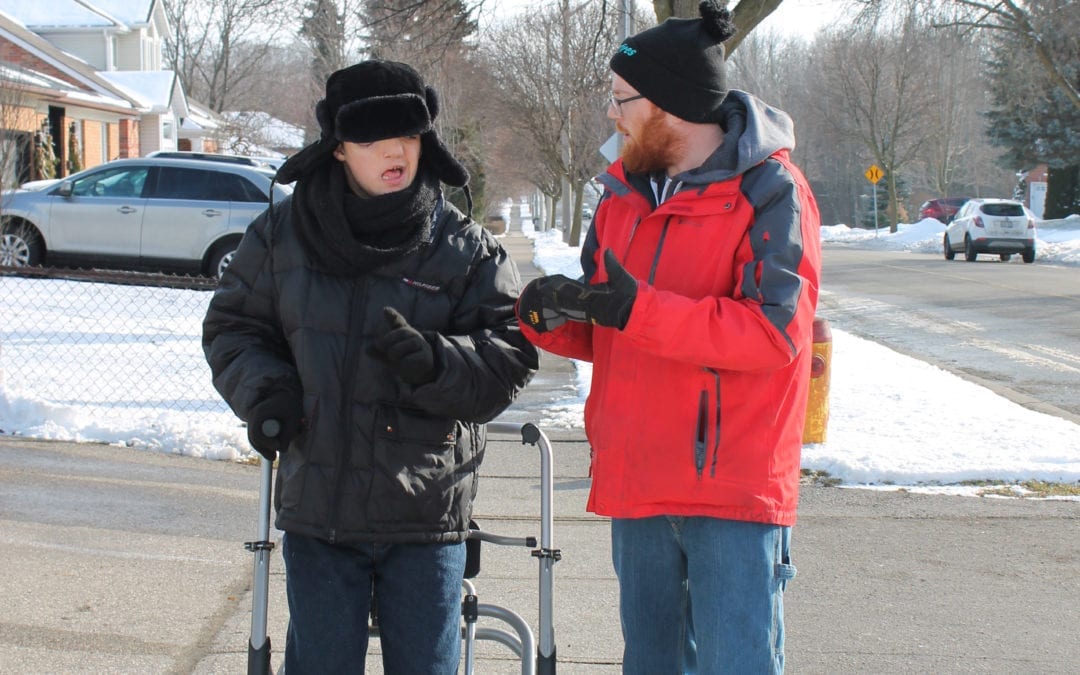“Fulfilling”, “collaborative”, and “supportive” are some of the words used to describe the role of an intervenor. A job title that is unfamiliar to many, yet a career that is on the rise.
Intervenors provide visual and auditory information to individuals with deafblindness. Their role is essential in connecting the person with deafblindness to other people and their community as a communication partner.
Jesse Downes, an intervenor that has worked at DeafBlind Ontario Services for 11 years, says, “Working as an intervenor helps me to be a better person, it allows me to guide someone to really experience the joys the world has to offer”.
Deafblindness is a combination of hearing and vision loss that is unique to each person. It impacts access to information, communication, as well as mobility, and can lead to social isolation and affect a sense of community.
About one percent of Canada’s population or approximately 466,420 people are deafblind. In Ontario, an estimated 211,250 individuals are deafblind.
“One thing I love about my job is seeing the growth and progress of the individuals we support each day. It is very rewarding teaching new skills, and then seeing those skills put into practice”, says Jesse.
“As an intervenor, every workday is different. The people we support at DeafBlind Ontario Services have a range of plans, personal goals, and commitments. The role of the intervenor may take you to a local volunteer placement where your support will encourage the individual’s independence, or on a community outing. The intervenor also bridges the gap with day-to-day tasks in their home”, says DeafBlind Ontario Services’ Chief Operating Officer, Karen Keyes.
“There can be anywhere from three activities for the day or nine… It all depends on the plans; it can mean a bigger community outing or something like a craft at home. I support each individual with these activities based on their specific and unique needs, always encouraging their independence. Throughout the day, there are times when you may need to administer medication or help with personal care too”, says Jesse.
“At the end of my day, I communicate with the individual(s) supported about what is next and who is coming in to work. I start my day with smiles and jokes and end my day with the same… I really can’t complain about that”.
The impact of the intervenor is immeasurable.
“It is amazing to see how excited some of the people we support get when they see or know you are coming in to work… Bonds are definitely formed”, says Jesse.
Intervenor Services is a sector that is currently experiencing growth and there is a shortage of trained intervenors. George Brown College’s two-year program, Intervenor for Deafblind Persons, is currently the only in Ontario.
If you are searching for an opportunity to learn, grow, and contribute to another person’s quality of life, consider pursuing a career as an intervenor.
When asked what advice he would give to someone considering a career as an intervenor, Jesse says, “Be flexible and patient… There is always more to learn. There are days when the person supported will be teaching you far more than you are teaching them. Being flexible in your approach and adaptable will help you to overcome any challenges that may arise”.
Whether you are graduating from high school or a post-secondary institution, or even pursuing a second career, consider exploring a role as an intervenor. DSW, PSW, or SSW certifications are ideal credentials. However, DeafBlind Ontario Services will provide necessary training to individuals without these certifications too.
“This job makes me feel good. I can come into work with a smile on my face and leave with an even bigger smile. Being apart of DeafBlind Ontario Services’ team, I know I can count on my peers for support and learn from the vast experiences each person brings to the table. There is definitely a sense of comradery in knowing that we are all here for the same common goal”, says Jesse.
DeafBlind Ontario Services provides accessible residential and customized support services across the province. Their holistic approach to Intervenor Services empowers people with deafblindness to achieve their goals and dreams.
DeafBlind Ontario Services provides a collaborative culture, supportive environment, open communication, and commitment to personal and professional development. As we welcome 2020, why not celebrate the new year with a new career. Learn more at www.deafblindontario.com and watch https://www.youtube.com/watch?v=epph6K0o6qE.




Recent Comments